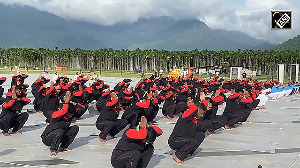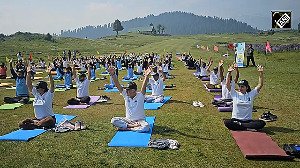Noting an upswing in bilateral ties over the years, the United States has pitched for greater role for India in the world and said it was keen to work with New Delhi on it.
"The US can work with India over its growing role in the world," US Ambassador to India Nancy Powell stressed during a panel discussion, which included Indian Ambassador in Washington Nirupama Rao.
"Trade relations are growing. It reflects our desire to proceed with arrangements for the civil nuclear deal," Powell said as Rao noted the India-US relationship has "wide political support across the spectrum" in both countries and stressed that it will not change.
"The US has extended support to India's membership of multilateral export regimes. We are exploring new frontiers," the Indian ambassador said.
Rao also said that India and US can replicate their Afghanistan model of cooperation in Central Asia.
"When it comes to Central Asia, we can do what we are actually doing in Afghanistan in areas of agriculture, women empowerment," she said.
Accepting the importance of Central Asia, Powell said private companies in America will have to take initiative and recognise the region's potential as a good place to invest.
"All of us recognise the rich potential in Central Asia. It's our private companies which have to look at this region and decide that it is good place to invest," the US Ambassador said.
"We certainly can help governments in the Central Asia and work with India as well to create and environment framework to make it attractive. First decision have to be driven by the private sectors," she said.
Powell also lauded the contributions of the three-million-strong Indian community to the American society.
"We are also trying to encourage more American students to come to India, she said.
Rao said India and the US are looking at ways to improve their intelligence sharing mechanism and forging cooperation in new areas for strengthening homeland security.
Replying to a question on cooperation in area of homeland security, she said, "We are looking at this moment on how we do a better intelligence and information sharing and also other aspects such as science and technology cooperation on homeland security."
Noting that the two countries have initiated Ministerial-level dialogue over homeland security, Rao said, "This is one component (intelligence sharing) on which we will see heightened activities in 2013. Constantly new areas of cooperation are being developed on homeland security."
Stating that cooperation between India and US has settled into a "certain pace and rhythm", both the diplomats said the relation between the two countries is elaborately conceived and developed.
"Our relation with India is extremely broad which includes trade, commerce, security, defence and economic aspects. We are having discussion on various issues such as natural gas, renewable energy, nuclear energy, higher education, health, commerce and trade," Powell said, adding "it is encouraging that we have great expectations from each other."
Both diplomats highlighted the need for people-to-people contact and underlined the importance of exchange programmes involving academicians, students and professionals from fields of innovation, science and technology and health.
"We would like more young American students come to India and understand the country. This is a question of being more informed on what is happening here and why it is useful and essential to know India better."
The panel discussion on "advancing a defining partnership for the 21st century", was chaired by former Indian envoy to the US Ronen Sen.






